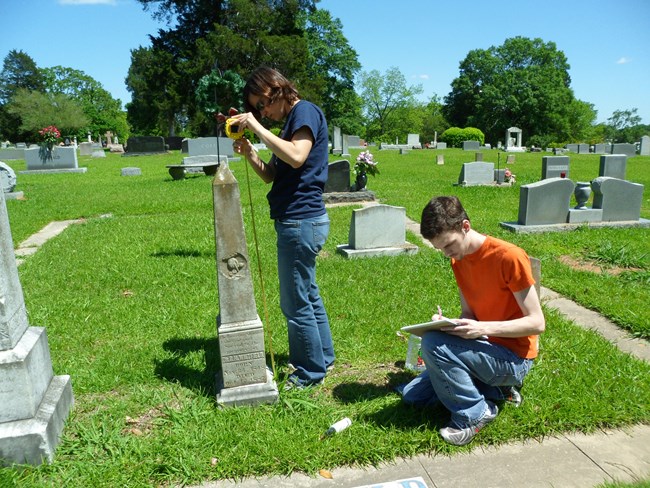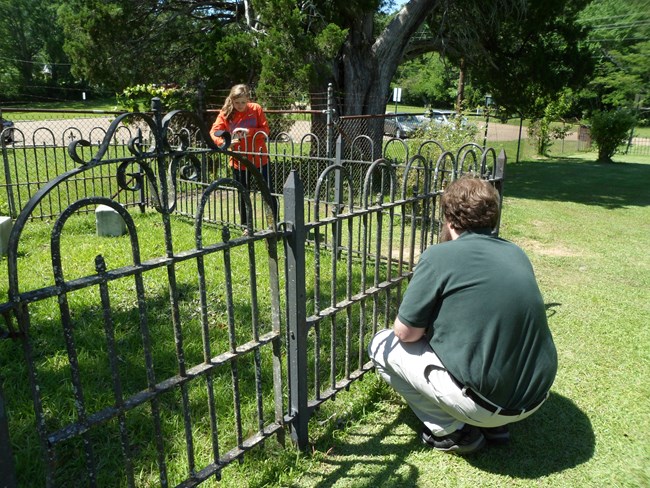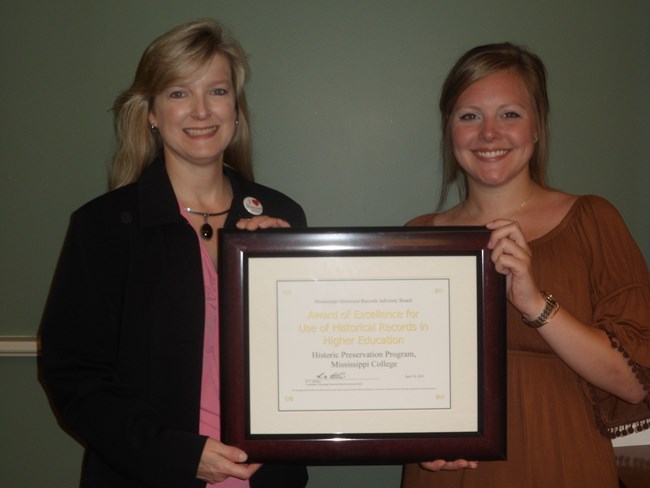Last updated: April 7, 2025
Article
Podcast 051: Historic Preservation Program at Mississippi College

National Park Service
Cemetery Training Course
Jason Church: And hello, this is Jason Church, Materials Conservator for the National Park Services’ National Center for Preservation Technology and Training, and I’m here today talking to Tricia Nelson, the Director of the Mississippi College Historic Preservation Program and we just finished up the International Cemetery Preservation Summit here in Niagara Falls where you had a poster about the school’s program. Tell us a little bit about the degree and the program and what your students are doing.
Tricia Nelson: Okay. Well in the fall of 2010, Mississippi College began offering a minor in Historic Preservation. It’s taught within the history and political science department. We do offer introductory classes such as Architectural History, Conservation, and Research and Documentation and then about a year ago we did offer a Historic Cemeteries course.
Jason Church: Okay and you teach in this program and you had a lot to do with the cemetery course. Tell us a little bit about that.
Tricia Nelson: The cemetery course was unique in that we were able to use a local cemetery, Clinton Cemetery, to do a lot of our work. We were able to document stones, study materials, and successfully conserve parts of the cemetery. Some of these projects included repair of the iron fencing and we were also able to use the D2 to clean biological growth and so the students were able to see before and after and it was very successful.
Tricia Nelson: We were also able to partner with historic Greenwood Cemetery in Jackson, Mississippi, established in 1823. It’s the final resting place for six Confederate generals, seven governors, fourteen mayors and a host of other prominent citizens such as famous writer Eudora Welty.
Tricia Nelson: The students were able to help with Greenwood. There had been a recent vandalism of the cemetery and so many of the urns were removed from their grave markers, so the students were able to help walk around and locate those urns and try to match those with their markers, flagging various areas that needed special attention because of advanced vandalism. We were able to help with a couple of cemeteries there and the students really did learn a lot.
Classroom & Field Work
Jason Church: Now how much do the students juggle the actual in-the-field work versus their classroom work when they’re in the program?
Tricia Nelson: Well we do a combination of lecture and fieldwork. In lecturing, I taught them about various historic cemeteries. The types of cemeteries we did study iconography and various things like that. We then went into conservation and then once we talked about those areas, we then went out to the cemetery and did some fieldwork.
Jason Church: Now the cemetery class, is this is something you’re going to repeat on a regular basis?
Tricia Nelson: It was successful but it was a limited number of students so it just depends on how much marketing we can do and because it’s an elective course, it’s not required. It really does take more marketing but again, it was successful for the cemeteries and it was a way for us to help those entities so I would like to offer it again in the future.

National Park Service
How many people enroll?
Jason Church: How many students typically are in one of the classes?
Tricia Nelson: We do have small classes at Mississippi College. We are a private, Christian institution so that is how we market ourselves. So that particular class had about eight or nine students in it, and I think that’s a wonderful course size because you can really work with the students and really get that one on one with them. So it’s not too large and a wonderful opportunity.
Student Academic Backgrounds
Jason Church: Now you mentioned this is an elective. For the corps people doing this program, what are their backgrounds?
Tricia Nelson: These are usually history majors. Again, we do have some minoring in historic preservation program. I do hope to develop a master’s program and some of the art students have been interested in our courses as well. So we do get some of those type students.
Jason Church: Now the program is fairly young, what are the students who are coming through this program hoping to do professionally once they leave?
Tricia Nelson: That’s questionable. I don’t know and I don’t know that they really know sometimes but what I try to do is give them a good background in preservation. I try to educate them in a lot of the different opportunities for a history degree that may be in preservation, a lot of the conservation type options, research type options.
Tricia Nelson: I feel that in teaching them about cemeteries, we’re opening up a whole new avenue that they probably never even realized was available. So there’s so many things we know they can do with this preservation degree, and so I think just educating them about those opportunities is one of the biggest things that we can do.

Mississippi College: Historic Preservation Program
Jason Church: If you live in the state of Mississippi and you have a cemetery or another historic site and you’re interested in working with the university, is that something you guys are open to if people wanted to contact you to maybe come to their site to do projects with students?
Tricia Nelson: Oh yes, that would be wonderful. That would give us the hands on opportunity to be able to go out and do fieldwork and I think it’s a win-win situation because in Mississippi we have so many resources, historic structures, and cemeteries that are in need of help. I mean this is one of the reasons why we began this program because there is no other program in the state. So, if we can partner with these entities to provide some conservation, documentation and things such as that, I think that that’s again just a win-win situation.
Jason Church: So you’ve told us a bit about the cemetery class and the projects you’ve done in Jackson, what other projects are the students doing in the program?
Tricia Nelson: We have had other projects going on. One thing that we did was we offered a ten day tour of Virginia, Washington DC, and some other areas to the students and we were able to gain firsthand knowledge of our country’s heritage. We toured a lot of historic sites such as Mt. Vernon, Monticello, Montpelier.
Tricia Nelson: We also tied it in to the civil war battlefields and also revolutionary sites and so the students were able to see historic sites and also some dealing with historic preservation. Then the next year we took them to Pennsylvania and Maryland and we were able to see additional historic sites. So we’ve had some wonderful opportunities to travel with the students and give them that first-hand knowledge that I think that all history students and historic preservation students should have.
Tricia Nelson:
Also in April of 2013, our Historic Preservation program received an award for excellence in the use of historic records in higher education because we are so adamant on research; this was awarded by the Historical Records Advisory Board. Because we are an institution of higher learning we were able to apply for that award and we did receive that. So we’re very proud of that.
Student Research
Jason Church: What kind of research are the students doing?
Tricia Nelson: Well part of the program is, as I mentioned earlier, research and documentation and one of those courses I actually teach students how to do a nomination for the National Register and so we get them into the archives.
Tricia Nelson: Fortunately the archives are right there in Jackson so we’re able to get them over to that and show them how to do the research and the documentation for that and so we’ve been able to document some of our historic resources in the area, which has been wonderful. People that we help are also so grateful because sometimes they have no idea where to start. And so I think that because we are able to do actual projects, they actually can learn so much more with that hands-on work that they do.
Jason Church: So if a student, even a high school student or current college student is interested in this program at Mississippi College, who should they contact, how should they go about that?
Tricia Nelson: They can contact me, Tricia Nelson. My email address is tnelson@mc.edu or you can call us at 601-925-3221.
Jason Church: Very good. Hopefully we’ll hear more from your students. Maybe one day we’ll be doing a podcast with some of the students and the projects they’re doing and watching them go out hopefully all over Mississippi and increase preservation awareness within the state and the country. We really appreciate you talking to us.
Tricia Nelson: Great. Thank you.
Read other Preservation Technology Podcast articles or learn more about the National Center for Preservation Technology and Training.
